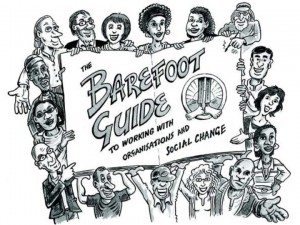The task was simple; Don’t reinvent the wheel.
It’s easier said than done, but this is what I attempted to do when I began working with the Community Development Resource Association (CDRA) in Cape Town to help conceptualize an online community.
At the end of last year, The Barefoot Guide that CDRA helped to produce had been downloaded over 50,000 times and has been widely lauded by people and organizations engaged in social change work. With an average of almost 100 people actively engaging with the website on a daily basis and a second guide on learning under development, it was increasingly apparent that an online community was needed to help further support development practitioners’ skills building activities.
We agreed The Barefoot Guide Online Community’s first steps should be informed and influenced by the ideas, challenges and insights of more experienced colleagues. So I interviewed nine people involved in established online communities related to international development. I also compiled a comprehensive list of over 65 online communities related to international development work, and actively participated in many of them to further understand the available features, content, and “feel” to consider.
Here’s a summary of some of the things I learned by revisiting the wheel:
The “keepers” of the community
A “core group” of community members who serve as the shapers and the drivers of the online community is vital to its success. Simon Hearn of the Outcome Mapping Learning Community says that a key aspect of his role as moderator is to shepherd this core group as leaders and ambassadors of the community’s goals, activities and direction.
Moderators help create “buzz”
In the beginning stages, moderators play a key role in creating interest and prompting participation, especially from the “core group” in order to help the community become active. HIFA2015, WiserEarth, km4dev and the Outcome Mapping Learning Community intentionally devoted time and financial resources to this aspect of establishing their online communities. Appropedia and the Peace and Collaborative Development Network have done this as well, though largely on a volunteer basis.
A handshake still matters
The combination of face-to-face and virtual interactions is a key aspect of online community building, as these personal connections provide energy and cohesion. Wibowo Sulistio of WiserEarth shared that they sponsor and encourage meet-ups on various issues and in various locations around the world and would like to do more because of their value to the community. Both Km4dev and the Outcome Mapping Learning Community also sponsor meetings and events for its members.
Different members, different priorities
There is a need to differentiate between types of members among an online community’s participants. For example, some have key functions in terms of connecting members, monitoring content, or providing summaries of online discussions. Within HIFA2015, these groups represent the different kinds of stakeholders involved in their advocacy campaign, from people working with international institutions such as the World Health Organisation to “front-line” health workers in clinics in the developing world. Within km4dev, members are also differentiated based on preferences for how they participate, be it via email listserve, social networking, or wiki contributions.
What are our goals? And later on…what are they again?
Clarity on the online community’s goals and functions is very important. Dr. Neil Pakenham-Walsh shared that he felt it was important for new efforts to distinguish between being a “community of practice” and a “community of purpose,” which in the case of HIFA2015 is a shared advocacy goal. Chris Watkins of Appropedia shared that the nature of wikis is to encourage the fluidity and wisdom of the community.
Continuing to revisit a community’s goals is also important. As the number of members grows, large numbers of people participating can “water down” or compete with the community’s original aims. Both the Outcome Mapping Learning Community and km4dev are struggling right now about how to communicate its core principles and still allow for “organic growth.” Lucie Lamoureux of km4dev shared that they have struggled with people misrepresenting the community’s “brand.” Craig Zelizer of the Peace and Collaborative Development Network highlighted his struggle with deciding how “open” to be on his site.
Aims first, tools second
An online community’s choice of tools and features should be grounded in the community’s purpose. New technological advances such as “tagging” content and opensource software are becoming readily available to enhance online collaboration. Thus it is important to find a platform that will allow for new features to be added, tweaked and integrated in the community so that they be utilized to facilitate linkages between members, in the case of WiserEarth, or to help catalog discussion outcomes, in the case of HIFA2015. Tori Hogan of Beyond Good Intentions encouraged us not to favor the aesthetic look of the website over usability.
Try and try again
Ongoing experimentation and adaptation are a key part of an online community’s strength and robustness. WiserEarth and Appropedia highlighted this as a key aspect of their overall philosophies. In the case of km4dev and the Outcome Mapping Learning Community, this is related directly to their respective disciplines/approaches. Collaborative partnerships feed many of the online communities’ growth and learning. Both HIFA2015 and Appropedia are engaged in partnerships that are expanding their reach and utilizing technological advances.
Steady funding remains a challenge for many of the online communities. Beyond Good Intentions, HIFA, Appropedia and km4dev all highlighted this hurdle. Therefore, a key aspect of online communities is to continue to educate donors about their potential, true costs, and significance and usefulness for its members.
The bottom line? Online communities depend upon social interaction and exchange between its members and the availability of online tools makes this more possible and more vital than ever before.
Revisiting the wheel helped us shape how The Barefoot Guide’s Online Community will support development practitioners in their professional and personal growth, so they can keep the wheel turning with organizations engaged in social change.
***
Related Posts
Online Communities for International Do-Gooders
What’s missing from the DIY aid debate? Overlooking the Capacity of Local Organizations
A New Discipline for Development Practitioners




Pingback: Tweets that mention How Matters / Revisiting the Wheel: Insights from Online Community Managers -- Topsy.com
One of the most important factors that all donor and INGO still not practicing is the indegenious institution for peacebuilding and its update on modern scientific line.As it is with in the people,easy,accessable,cheap,and trusted.we work the same jirga in our pukhtooncommunity in pakistan and afghanistan add jirga,train elders and governiment officials and the result is very encourging.There many instistution around the world like Sulha in middle east,Gachcha,brazai padrai in africa,morai tribes and native americans customs that are updated with Restorative justice and according to needs of the community.Any help in this regards are welcome.Jirga book is already on our web for free download.
Ali
So many more online communities I need to join! There are so many good resources out there. I think the “different members, different priorities” is a key factor – there are do many different focuses in international development and the needs for information and support vary so much for each org and job function. On the other hand, it’s so valuable to peek into another sphere to see what is being discussed among those members and find where there is overlap!